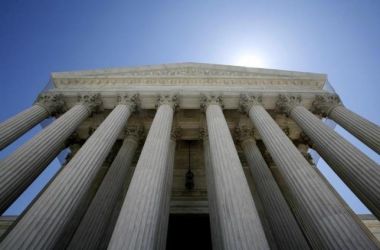Protecting religious freedom: How far should the law go?

Religious liberty is one of the biggest issues facing conservative Christians at the moment. In countries that are increasingly socially liberal, in which forms of behaviour and badges of identity that would have been unthinkable a few decades ago are now mainstream, how far should the law protect their ability to opt out?
Needless to say, it's sexuality and sexual issues that are the flashpoint. Should a Christian florist be free to refuse to provide flowers for a gay wedding? Should a Christian registrar be free to refuse to register one? Should they even be allowed at all?
Now an influential Washington committee has come up with what it presumably hoped was a constructive answer for US citizens. Peaceful Coexistence: Reconciling Nondiscrimination Principles with Civil Liberties was produced by the bi-partisan US Commission on Civil Rights (USCCR). It was originally scheduled to report in 2013 but the report's release was repeatedly delayed and even now two of its seven members have dissented from its conclusions.
The 306-page report contains an exhaustive analysis of how attempts to secure the maximum possible religious liberty and the maximum possible protection from discrimination have been fought out through the courts. It's pretty dense, but it concludes that religious exemptions from anti-discrimination laws "significantly infringe upon" civil rights and that "religious exemptions from non-discrimination laws and policies must be weighed carefully and defined narrowly on a fact-specific basis".
Furthermore – and this is what has really riled conservatives – Commission chairman Martin Castro launched a stinging attack on attempts to extend religious exemptions. He said: "The phrases 'religious liberty' and 'religious freedom' will stand for nothing except hypocrisy so long as they remain code words for discrimination, intolerance, racism, sexism, homophobia, Islamophobia, Christian supremacy or any form of intolerance."
He continued: "Religious liberty was never intended to give one religion dominion over other religions, or a veto power over the civil rights and civil liberties of others. However, today, as in the past, religion is being used as both a weapon and a shield by those seeking to deny others equality. In our nation's past religion has been used to justify slavery and later, Jim Crow laws. We now see 'religious liberty' arguments sneaking their way back into our political and constitutional discourse (just like the concept of 'state rights') in an effort to undermine the rights of some Americans."
'Shocking suggestion'
His words drew a fierce rebuttal from the Archbishop of Baltimore, among others. William Lori, chairman of the US Bishops Ad Hoc Committee for Religious Liberty, said the notion that people of faith are "comparable to fringe segregationists from the civil rights era" is a "shocking suggestion". "The vast majority of those who speak up for religious liberty are merely asking for the freedom to serve others as our faith asks of us," he said.
Another critic is Al Mohler, president of the Southern Baptist Theological Seminary, who addressed the report in his 'Briefing'. He cites various criticisms of Castro's words, describing them as "ominous" and saying religious exemptions are "claimed to be the problem, so that even these religious exemptions are held to be suspect and they should be very limited, he says, in scope. And in every case, Chairman Castro made clear, they're simply a form of prejudice and discrimination, period."
But here's the thing: Castro's remarks are very, very strong, and probably – if he really wanted to convince conservatives he had a point, which seems unlikely – unwise. But look at them again, and look at the sort of rhetoric purveyed by religious conservatives today – not just in America, but in many other historically Christian countries, including the UK – and it's very hard to argue with him. There's a persecution narrative that's reinforced by every reaction like Lori's and Mohler's. It's the right-thinking, clean-living people against the rest of the world. The government is intent on subverting Christian morality and creating a moral free-for-all. We should stand up for Christian values through the courts, and things we believe are wrong ought to be illegal – and if we can't make them illegal, we should have an opt-out so we can disregard their legality if we want to.
Free to discriminate?
And the question is, how does this really help? How does campaigning for freedom to discriminate commend the gospel? What sort of message does it send to people who when they hear the word "Christian" just think, "They're the ones who want to be free to reject people"?
The other way of looking at the USCCR report is to say that it reflects the sort of careful calculations and fine balancing of rights and responsibilities that are an inevitable – and very precious – part of living in a democratic society committed to everyone's freedom, not just the freedom of a few. Part of being grown up is that you understand that you can't have everything you want, and that other people's freedoms are going to impinge on your own.
And as Christians, we should welcome that. We ought to be the ones who reject the narrative of power and dominance that characterises debate around these issues. What happened to Jesus' teaching about turning the other cheek and going the extra mile, and being blessed if we face insult or abuse? Is it really so important to win?
There is a better conversation to be had, and it starts, surely, with listening – even to Martin Castro.
Follow Mark Woods on Twitter: @RevMarkWoods











